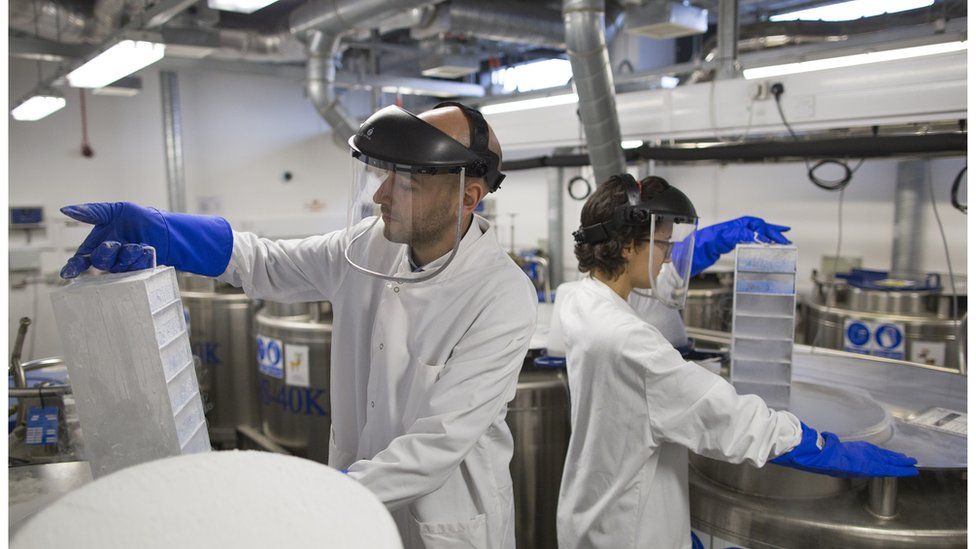Would Brexit compromise the future of UK science?
- Published

Leading scientists have been particularly vocal in arguing against the UK leaving the European Union. But how would Brexit really affect UK science?
"I grew up in France and did all my studies and my PHD in Paris, but I came to Cambridge because the UK is one of the best places to do science in Europe."
Sitting in a corner of his lab at the Department of Veterinary Medicine in Cambridge epidemiologist Dr Olivier Restif explains why he wanted to come and work in the UK.
"Infectious diseases spread across borders and we need to work together, but also develop policies together, to control these diseases and fund large research programmes, and that can only be done within the EU."
He's not alone. More than a third of the research scientists working at Cambridge are overseas nationals. 23% are from other EU countries. A reflection of the international nature of modern scientific collaboration.
"It's about attracting the best brains to do the best science" according to the head of the School of Veterinary Medicine at Cambridge Professor James Wood. "The days of the single genius working alone are over. We need to be part of the family of researchers working together, and the more that we can enhance this sort of collaboration the better."
Freedom to research
Cambridge, and UK science, has thrived in this collaborative, internationalist environment, emerging as Europe's scientific powerhouse and punching well above its weight in terms of research papers published, citations, university rankings and Nobel Prizes.
All of which helps to explain why 13 of Britain's leading scientists, including the physicist Professor Peter Higgs and the President of the Royal Society Sir Paul Nurse, added their voices over the weekend to the chorus of dons, dames, knights and Nobel laureates who have come out emphatically for "Remain".
In a letter to the Daily Telegraph, the group said science should be "front and centre in the EU debate" and that losing European funding would put UK research "in jeopardy".
But is this 'greater than the sum of its parts' argument really the result of EU membership? The money flowing from European coffers only adds up to about 3% of total research spending and, according to Matt Ridley, who sits on the Science and Technology Committee of the House of Lords, you don't have to be a member of the European Union to apply for it.
"The main EU funding programmes like FP7 and Horizon 2020 are open to countries like Tunisia and Israel, Iceland, Norway and Switzerland. So there's absolutely no way as the leading scientific nation in Europe that we wouldn't be able to contribute to, and take money from, those programmes."
Lord Ridley also points out that the EU is just one small part of a global playing field when it comes to scientific collaboration. He thinks we would be stronger outside the EU because we would be free to forge stronger links with scientists in Asia, America and the Indian sub-continent "The EU is a very small part of the world scientific universe now, and we are discriminating in favour of it and discriminating against the rest of the world."
That global, rather than narrowly European, approach is also a key theme for students like chemical engineer Charles Perez-Storey on the stump for the Cambridge Brexit Campaign.
"The group-think in Cambridge is that we need to be in the European Union. But I view Brexit as a way to liberate Britain from a sclerotic organisation and open up our frontiers to the rest of the world."
It seems perfectly possible that the UK could reposition itself as a global, rather than European, scientific power house, but there's a palpable sense in Cambridge that 'if it ain't broke why fix it'? Certainly Olivier Restif would view a vote to leave the EU as a cue to pursue his career elsewhere.
"I still have the freedom to move and I would certainly consider leaving."
- Published29 April 2016
- Published10 May 2016
- Published26 February 2016